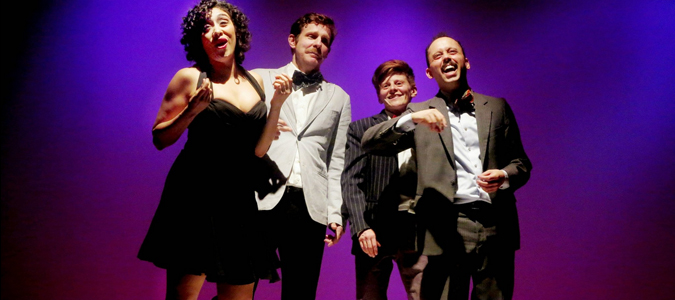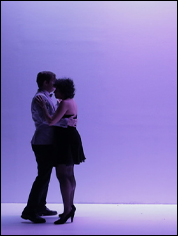

The Floatones
Opening Night: May 1, 2015
Closing: May 10, 2015
Theater: La MaMa E.T.C.
“The Floatones” is an experimental theater work in which four people form an “encounter support group” that sings about “post meaning” and living “content free.” On the cutting edge between entertainment and self-help, they inspire each other with idiosyncratic gestures and atonal harmonies. Written by the late downtown theater legend Jim Neu, The Floatones return to The Club at La MaMa after 20 years with a new generation of downtown performers.
BUY TICKETSREAD THE REVIEWS:
May 5, 2015
Very nearly unclassifiable and utterly delightful, “The Floatones,” Jim Neu’s fantastical, irrational Zen koan of a musical, returns to La MaMa about 20 years after its premiere there. Four characters, named for the actors who portray them, stand on a bare stage chanting mottos and jingles and riddles that make no sense except when they do. Keith McDermott, who appeared in the original production, directs with the choreographer Catherine Galasso. They have cast four dancer-actors (including the downtown favorite Jess Barbagallo), put them in neat cocktail attire and urged them toward an attitude that combines high intensity and low affect. Mr. Neu, who died in 2010, was an experimental theater standard-bearer and a La MaMa habitué. He wasn’t particularly compelled by plot or character and was less interested in meaning itself than how meaning is made and propagated. He often wrote plays about various kinds of influencers, such as television gurus and market researchers. There isn’t much story in “The Floatones,” which is much of the point. These characters, we learn, met in “an encounter support group meeting weekly to practice positive experiences with other people,” some of them by court order. One is an actor, another was arrested for an altercation in the Inwood neighborhood of Manhattan. That’s all we know, which the script suggests is more than enough. These four have formed the titular group, which uses doo-wop songs to preach a gospel of radical nonattachment. They’re anti-meaning, anti-context, anti-sense, anti-identity. “We’re past reason,” they sing. “We’re post plot. We’re connection-free. We’re content-not.” (They are also sometimes pitch averse.)
READ THE REVIEW


















